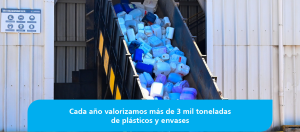
Recently, in the Official Gazette, the Ministry of the Environment (MME) published the goals for the collection and revaluation of batteries and electrical and electronic devices established by the Extended Producer Responsibility policy (EPR Law).
The document establishes, that as a country we must attain 3% of the collection and revaluation of this waste during the first year, until 45% is reached by year 10, including a series of obligations for importers and marketers of these products.
In more detail, the guidelines for the correct management of batteries and electrical and electronic equipment (EEE) are to: regulate, on the one part, large batteries -more than 5 kilos- and small ones. All EEE that works with electricity, divided into big and small ones (less than 50 centimeters) such as a flash drive, will also be regulated.
At the same time, the largest EEE in size will be divided into temperature exchange devices - air conditioners and refrigerators - photovoltaic panels, and a third group as TVs, computers, refrigerators, washing machines, dishwashers and toasters.
The draft also takes into consideration the prohibition of the importing of batteries of any size that contain 0.1% mercury and 0.01% cadmium, regarding the small ones. Although most are not dangerous today, there are still some that contain heavy metals.
Respecting the obligations established by the EPR Law for batteries and EEE marketers, the document establishes that, starting from the third calendar year of entry into force of the decree, they must receive batteries and EEE in disuse "at no cost for consumers".
In the case of large electrical and electronic devices, marketers will be obliged to remove, "free of charge", an amount of large devices equivalent to the new ones purchased if required by the consumer. In other words, if the consumer buys a refrigerator or a washing machine at a retailer, the latter or the management system adhered to, must take the disused appliance at customer request.
For more information, we invite you to review the most recent publication of Diario Financiero.







